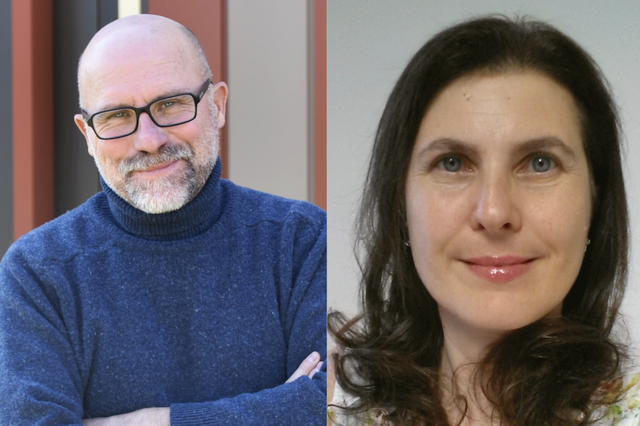The University of Bologna hosts two new projects funded by ERC Advanced Grants
A study on the Balkan Route will investigate the intricate workings of unofficial migration corridors, another study will foster the benefits of artificial intelligence and data analysis in the legislative and legal fields: the University of Bologna has been awarded two of the prestigious grants conferred by the European Research Council to support the most advanced scientific research
The University of Bologna has secured two new projects funded by the European Research Council (ERC), the body of the European Union that supports talented scholars engaged in frontier research.
More specifically, these are two ERC Advanced Grants, i.e. grants awarded to scholars leading the way in terms of novelty in their field of research and boasting a track record of significant achievements over the last ten years.
The two prestigious grants, with a combined worth of almost €5 million, were awarded to Claudio Minca, professor at the Department of History and Cultures, for the TheGAME project, and to Monica Palmirani, professor at the Department of Legal Studies, for the HyperModeLex project.
THEGAME PROJECT BY CLAUDIO MINCA
TheGAME project has been awarded a €2.5 million grant and is the first geographical research project to study an unofficial migration corridor in its entirety: the Balkan Route.
Every year, tens of thousands of migrants cross this unofficial corridor running from Greece to Western Europe through Bulgaria, Romania, Albania, North Macedonia, Kosovo, Montenegro, Serbia, Bosnia-Herzegovina, Croatia and Slovenia. This corridor is characterised by a complex geography and consists of visible and invisible places, a variety of ever-changing micro-pathways, camps and borders, violence and solidarity. Across this complex geography, migrants trace unofficial paths toward Europe while embarking on the so-called "Game". This is the term they ironically use to describe their journey across the heart of the Balkans.
"Numerous unofficial camps hosting thousands of refugees traveling towards Western Europe have appeared along this corridor," explains Prof. Claudio Minca, Principal Investigator of the Project. "These camps play a fundamental role in organising The Game and keeping it going. They not only serve as temporary shelters but also as services and information exchange points, as meeting points with other migrants and human smugglers, as places to find shelter, wait and plan the next steps."
TheGAME project will understand the functioning of these migratory routes by starting to analyse the unofficial camps scattered throughout the corridor, their social and political life, and the way in which these camps are connected in the generation of the ever-changing geography of the Balkan Route. The project will also develop an "in-progress archive" that will record the experiences of migrants during their journey through different pathways across the Balkans and draw "counter-maps" to retrieve and retain the memory of camps and unofficial passages that have disappeared or been destroyed.
"TheGAME project has the potential to radically modify how we now analyse and try to understand unofficial routes, temporary camps employed by migrants and the social, cultural and political geographies they create," confirms Minca.
The material collected throughout the Route will allow to formulate a first hypothesis on the complex functioning of unofficial migratory corridors, thus proposing an innovative and inclusive methodology that can be applied to corridors in other parts of the world.
THE HYPERMODELEX PROJECT BY MONICA PALMIRANI
Would you trust a legislator guided by artificial intelligence? What guarantees can law provide for a proper use of artificial intelligence when writing laws and enforcing norms?
The HyperModeLex project has been awarded a €2.5 million grant and is aimed at creating a new legal-theoretical framework. This new framework should take into account digital transformation from the very outset of laws and promote the benefits of artificial intelligence and data analysis in this field while preserving the principles of legal theory and democratic values and complying with ethical issues such as legitimacy, normativity, interpretation, flexibility, transparency and the autonomy of both legislators and citizens.
"Over the last thirty years, the academic community of Artificial Intelligence and Law has produced significant results, although often fragmentary and not fully integrated with legal theory, philosophy of law, and the foundations of digital constitutional law," explains Prof. Monica Palmirani, Principal Investigator of the project. "HyperModeLex seeks to address these problems with an interdisciplinary approach providing answers to a number of key questions such as what is the essence of law in the digital age, how to teach machines to interpret and be flexible, how to protect the democratic principles of legitimacy of the legislative process when machines are involved in it, how to preserve the autopoietic role of legal language when creating laws, how to maintain the autonomy of citizens and legislators employing artificial intelligence."
In order to get these answers, the project will first determine the necessary prerequisites for emerging technologies supporting the legislative process while also considering the issue of the interpretation of laws and norms. The resulting hypotheses will then be tested with a series of technological experiments through the so-called "Hybrid AI" approach applying computational linguistics theories. Finally, the research activity will focus on the idea of individual-centered artificial intelligence, considering how human-machine interaction can foster the explicability and transparency of norms.
"Are we afraid of artificial intelligence entering the halls of Parliament? Not if we have a solid theoretical legal background allowing us to make the best use of the most advanced techniques to guide the evolution of digital legislation in a 'humanly sustainable' and not 'zero intelligence' framework," Palmirani explains. "The HyperModeLex project will allow defining a new concept of 'Smart Legal Order', providing institutions and society with a legitimate source of law that is both computable and understandable by artificial intelligence for more effective and efficient regulation, while offering the LegalTech market a secure framework for the production of legal tools."
The project will be developed at the Department of Legal Studies working in close collaboration with ALMA Human-Centered Artificial Intelligence to create the necessary interdisciplinary synergies in AI and data science.

